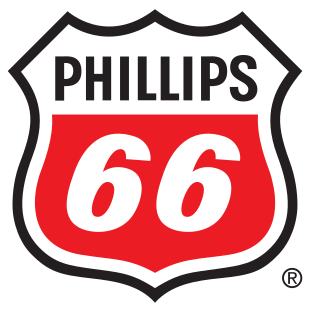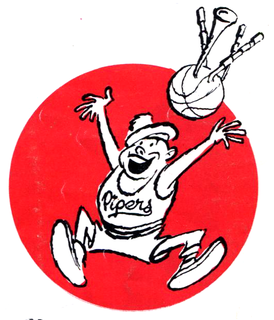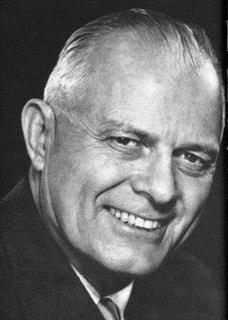
Bartlesville is a city mostly in Washington County in the U.S. state of Oklahoma. The population was 37,290 at the 2020 census. Bartlesville is 47 miles (76 km) north of Tulsa and 18 miles (29 km) south of the Kansas border. It is the county seat of Washington County. The Caney River runs through Bartlesville.
The National Industrial Basketball League was founded in 1947 to enable U.S. mill workers a chance to compete in basketball. The league was founded by the industrial teams belonging to the National Basketball League (NBL) that did not join the National Basketball Association when the NBL merged with the Basketball Association of America.
The National Alliance of Basketball Leagues (NABL) is the descendant of the industrial-based basketball clubs that formed into the National Basketball League (NBL) in the early 1930s.

Kenneth Stanley "Bud" Adams, Jr. was an American businessman who was the founder and owner of the Tennessee Titans, a National Football League franchise. A member of the Cherokee Nation who originally made his fortune in the petroleum business, Adams was chairman and CEO of Adams Resources & Energy Inc., a wholesale supplier of oil and natural gas. He was instrumental in the founding and establishment of the former American Football League. Adams became a charter AFL owner with the establishment of the current Titans franchise, which was originally known as the Houston Oilers. He was the senior owner with his team in the National Football League, a few months ahead of Buffalo Bills' owner Ralph Wilson. Adams also was one of the owners of the Houston Mavericks of the American Basketball Association and the owner of the second Nashville Kats franchise of the Arena Football League. He was elected to the American Football League Hall of Fame, an online site, but as of 2018 is not a member of the Pro Football Hall of Fame, despite several nominations and an ongoing effort to make him such.

The Phillips 66 Company is an American multinational energy company headquartered in Westchase, Houston, Texas. It debuted as an independent energy company when ConocoPhillips executed a spin-off of its downstream and midstream assets. Its name dating back to 1927 as a trademark of the Phillips Petroleum Company, the newly reconfigured Phillips 66 began trading on the New York Stock Exchange on May 1, 2012, under the ticker PSX. The company is engaged in producing natural gas liquids (NGL) and petrochemicals. The company has approximately 14,000 employees worldwide and is active in the United States, Australia, United Kingdom, Germany, Austria, and Switzerland.

Robert Albert Kurland was a 7 feet (2.1 m) American basketball center, who played for the two-time NCAA champion Oklahoma A&M Aggies basketball team. He led the U.S. basketball team to gold medals in two Summer Olympics, and led his AAU team to three national titles. He is a member of the Naismith Memorial Basketball Hall of Fame.

The Cleveland Pipers were an American industrial basketball team based in Cleveland, Ohio in the 1950s and early 1960s. The Pipers are mostly known for having played in the short-lived American Basketball League from 1961–62. They were also a power in the days Amateur Athletic Union basketball and the National Industrial Basketball League (NIBL) which peaked in the late 1950s and early 1960s.
Marcus Ross Freiberger was an American basketball player from Amarillo, Texas who was a Gold Medalist in the 1952 Summer Olympics.

Omar M. "Bud" Browning was an American basketball coach. In 1948, he became the United States' second Summer Olympics men's basketball head coach. Browning led 1948 USA team to a final record of 8–0, en route to a gold medal at the 1948 Summer Olympics basketball tournament, in London. Browning became the winning-est coach in AAU tournament history, when his teams won AAU championships in 1962 and 1963.

James Carlos McNatt was an All-American basketball player for the Oklahoma Sooners and the AAU's Phillips 66ers. At Oklahoma, McNatt led his team to the first-ever NCAA Final Four in 1939, and at Phillips 66, McNatt guided the 66ers to four consecutive AAU national championships. He was a two-time All-American at Oklahoma and a four-time AAU All-American for Phillips 66. The speedy player came to be known by his nickname “Scat” McNatt, a moniker originally traced back to the term “Boy Scats” which sportswriters had used to describe McNatt's fast-breaking, sophomore-led 1937-38 Oklahoma Sooners basketball team. McNatt grew up in Norman, Oklahoma, attended Norman High School, and then opted to stay in his hometown to play basketball for the University of Oklahoma.
Robert Eugene Jeangerard was an American basketball player who competed in the 1956 Summer Olympics. Born in Evanston, Illinois, Jeangerard played collegiately at the University of Colorado. He then played for the Phillips 66ers in the NIBL. The Phillips 66ers won the Olympic Trials in 1956, and Jeangerard was one of five players from the Phillips 66ers selected for the 1956 Olympic team, along with their coach, Gerald Tucker. Bill Russell and K.C.Jones, two-time NCAA Champions from the University of San Francisco, were also on the 1956 Olympic team, which won the gold medal.

Jerome Franklin Shipp was an American basketball player. He played for the U.S. national team at the 1963 FIBA World Championship, 1963 Pan American Games and 1964 Summer Olympics, winning a gold medal at the latter two competitions. Shipp was also a three-time Amateur Athletic Union All-American for the Phillips 66ers in Bartlesville, Oklahoma during the 1960s.

The Phillips 66ers were an amateur basketball team located in Bartlesville, Oklahoma, and sponsored and run by the Phillips Petroleum Company. The 66ers were a national phenomenon that grew from a small-town team to an organization of accomplished amateur athletes receiving national and worldwide attention. Under the sponsorship of the company's owner, Frank Phillips, the team, which began playing in 1919, participated in the Amateur Athletic Union, the nation's premier basketball league before the National Basketball Association. Between 1920 and 1950, some of the strongest basketball teams in the United States were sponsored by corporations—Phillips 66, 20th Century Fox, Safeway Inc., Caterpillar Inc., and others.

Kenneth Stanley "Boots" Adams was an American business executive, University of Kansas booster, and civic philanthropist of Bartlesville, Oklahoma. Adams began his career with the Phillips Petroleum Company in 1920 as a clerk in the warehouse department. Twelve years later, he was chosen by founder and president Frank Phillips to fill the newly created position of Assistant to the President. On April 26, 1938, Adams was elected president of Phillips Petroleum Company by the unanimous vote of the company's Board of Directors.

Scotty Steagall was an American basketball player. After a collegiate career at Millikin University, Steagall was selected in the second round of the 1951 NBA draft by the Indianapolis Olympians. He skipped the NBA, however, and opted instead to play in the Amateur Athletic Union for the Phillips 66ers, one of the most dominant teams in amateur basketball during the mid-20th century.

John Stanich is an American retired basketball player. He was an All-American college player at UCLA and represented the United States in the 1950 FIBA World Championship.
The Caterpillar Diesels was an amateur basketball team located in Peoria, Illinois and sponsored and run by the Caterpillar Inc. company. The Caterpillars were one of the most successful teams of the Amateur Athletic Union League in the 1950s and they became world-wide known in 1952 when five of their players represented the USA team in the Olympics, winning the gold medal.
The Buchan Bakers was an amateur basketball team located in Seattle, Washington and competed in the National Industrial Basketball League. The Bakers were one of the most popular teams of the Amateur Athletic Union, rising to fame in 1957 when the beat the Phillips 66ers in the AAU Tournament final. The team was sponsored by the Buchan Baking company, thus they adopted their name. During the 1955-56 season, the Buchan Bakers traveled to Asia, playing teams from Japan, China and they were the first AAU basketball team to play against Eastern European teams during the Cold War.
Chester Noe is an American former basketball player. He was an all-city center while he played at Washington Preparatory High School in his hometown of Los Angeles, California. Noe played college basketball for the Oregon Ducks from 1950 to 1953 and led the Ducks in scoring during his final two seasons. He was a first-team All-PCC selection and named the Ducks' Most Valuable Player in 1953.










